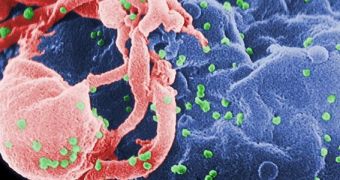Scientists from the US National Institutes of Health (NIH) and the University of North Carolina (UNC) announce the development of a new toxin that can kill cells infected with the human immunodeficiency virus (HIV). The molecule has already been proved to work in experiments conducted on lab mice.
What is even more remarkable is that the toxin appears to be working even in cells where HIV is actively multiplying even after antiretroviral therapies are administered. This implies that the new molecule, called 3B3-PE38, has the potential to kill resistant viral cells as well.
The immunotoxin would work best in combination with antiretroviral therapies, which are able to significantly reduce HIV replication rates inside infected cells. However, these therapies alone are insufficient to actually destroy the damaged cells. The toxin may represent the extra step needed to push these cells to their deaths, EurekAlert reports.
Despite these encouraging results, the research team says that more studies are required to understand how these two therapies can be combined, and which HIV strain they best work against. We can expect to see a complete set of guidelines on this treatment option within the next few years.

 14 DAY TRIAL //
14 DAY TRIAL //